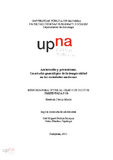Mostrar el registro sencillo del ítem
Aceleración y presentismo. Un estudio genealógico de la temporalidad en las sociedades modernas
| dc.contributor.advisor | Beriain Rázquin, Josetxo | es_ES |
| dc.contributor.advisor | Sánchez Capdequí, Celso | es_ES |
| dc.creator | Dávila Martín, Estefanía | es_ES |
| dc.date.accessioned | 2016-07-04T13:23:17Z | |
| dc.date.available | 2017-01-26T00:00:16Z | |
| dc.date.issued | 2016 | |
| dc.date.submitted | 2015-01-26 | |
| dc.identifier.uri | https://hdl.handle.net/2454/21010 | |
| dc.description.abstract | El objetivo de esta investigación doctoral consiste en estudiar las transformaciones del concepto de tiempo en la modernidad y analizar sus consecuencias desde el marco de la teoría sociológica. Pensar el tiempo presente requiere afrontar una complejidad paradójica. Por una parte, la aceleración del tiempo parece una constante histórica desde mediados del siglo XVIII (Koselleck,Hartog), mientras que por otra, este mismo aumento de la velocidad nos ha conducido a una especie de “inmovilidad fulgurante” (Rosa) en la que nos encontramos atrapados entre la urgencia y la falta de horizontes de nuestro presente, desvinculado tanto de la autoridad del pasado premoderno como de la confianza en el futuro propia de la primera modernidad. Nuestro análisis no pretende defender la muerte del tiempo sino recuperar otra genealogía del mismo, a través del enfoque fenomenológico heredero de Heidegger, que incluya en la definición de tiempo social la idea de presentes múltiples y cambiantes. | es_ES |
| dc.description.abstract | The object of this dissertation is to consider the key role of the temporal dimension in the process of modernity. From the conceptual analysis of Koselleck, we draw a genealogy of the multiples regimes of historicity that reveals a relation between the category of acceleration and the concept of presentism. The studies of the historian François Hartog and the sociologist Hartmut Rosa have guided us to develop our research. Nowadays, the present seems disconnected from past and future horizons, being reduced to a shortened time that reflects a social experience of temporal indigence. ‘Going nowhere fast’ is the paradox that seems to arise from our temporal trajectories in late modernity, according to some theories of social acceleration and specially the analysis of Hartmut Rosa. This thesis confront us with a dual diagnosis of modernity, showing two-faced Janus: on the one hand, the acceleration of time seems a historical constant since the mid eighteenth century, while on the other, this same increase speed has led to a kind of ‘immobility’ in which we find ourselves caught between the urgency and the lack of horizons of our present, detached from both the authority of the past (pre-modern) and confidence in the future (of the first modernity ). Are we seeing the two faces of the same phenomenon? Could the uncontrolled acceleration drive us to a loss of hierarchy which prevents the emancipatory project of modernity? | en |
| dc.format.extent | 292 p. | |
| dc.format.mimetype | application/pdf | en |
| dc.language.iso | spa | en |
| dc.relation.uri | https://biblioteca.unavarra.es/abnetopac/abnetcl.cgi?TITN=464871 | es |
| dc.subject | Sociología | es_ES |
| dc.subject | Sociology | en |
| dc.subject | Tiempo | es_ES |
| dc.subject | Time | en |
| dc.subject | Estudio genealógico | es_ES |
| dc.subject | Genealogical study | en |
| dc.subject | Sociedades modernas | es_ES |
| dc.subject | Modern societies | en |
| dc.title | Aceleración y presentismo. Un estudio genealógico de la temporalidad en las sociedades modernas | es_ES |
| dc.type | Tesis doctoral / Doktoretza tesia | es |
| dc.type | info:eu-repo/semantics/doctoralThesis | en |
| dc.contributor.department | Sociología | es_ES |
| dc.contributor.department | Soziologia | eu |
| dc.rights.accessRights | Acceso abierto / Sarbide irekia | es |
| dc.rights.accessRights | info:eu-repo/semantics/openAccess | en |
| dc.embargo.terms | 2017-01-26 | |
| dc.description.doctorateProgram | Programa Oficial de Doctorado en Dinámicas de Cambio en las Sociedades Modernas Avanzadas (RD 1393/2007) | es_ES |
| dc.description.doctorateProgram | Gizarte Moderno Aurreratuen Aldaketa Dinamiketako Doktoretza Programa Ofiziala (ED 1393/2007) | eu |


